A Walk in Industrial Bushwick with Rax King
"Oh, would you look at that. The cop’s not here. We can go this way."
“Minimize? Why would I want to minimize? Maximize is what you want to do. Maximize everything!”
An older woman wearing a red leopard print jacket and sunglasses that cover her entire face is admonishing me on the streets of Park Slope. Beside her is a dog that doesn’t so much seem like a dog as it is a mythical creature. The animal is giant, blindingly white, and looks to be made entirely out of new, clean mop heads—as if a bunch of mops took notes while watching Fantasia’s “The Sorcerer's Apprentice” and decided to assemble Voltron-style into a marvelous beast.
I am walking my dog, Zorra, before going to meet Rax King for an afternoon ramble. My dog and the magical pile of mops had stopped to greet each other, so I made small talk with the mop dog’s owner. I’d asked the woman where she lived, and she'd answered, “Oh, I’m over here. But I used to be over there. I lived in a small apartment, and now I live in an even smaller apartment.” Trying to be polite—a failure of mine—I replied, “It’s good to minimize, right?” Which is when the woman’s head snapped up and she locked eyes with me through the lenses of her dark glasses.
“Maximize everything!”
I couldn’t have wished for a more perfect meeting before skateboarding across Brooklyn to meet Rax King at the Bake Shop on Flushing Ave. The day will involve illegally walking through a train yard, standing on a bridge in a Superfund site, and a chandelier store that very well could be owned by the woman in a red leopard print jacket who waves at me while she and her dog head back to her very small, but surely maximized apartment.
Isaac: So where are we walking?
Rax King: We're in Bushwick. There’s something about walking through industrial Bushwick that I really like. This is a walk I do often, and we’re going to go one of two routes, depending on whether there's a cop standing in front of the little creek that I like to go to or not.
I: Ok, good to know that this walk might involve some light trespassing. Is this your neighborhood? Is this where you live?
RK: Yeah, I live here. I’ve lived here for as long as I’ve lived in New York City—about seven years now—aside from the first few months when I lived in Sunset Park. In recent years Bushwick has gotten a bit of a reputation for being a party neighborhood, which it certainly is now more than when I first moved here. But I live in the more family friendly, residential part of Bushwick. I like that part of the neighborhood, and I also really like the industrial side of the neighborhood. It makes for good walking.
I: When you moved here seven years ago, where were you moving from?
RK: DC.
I: Washington, DC proper or—
RK: Proper. It’s where I’m from. Then when my parents split up, my mom and I moved to Woodley Park and my dad moved out to Rockville, Maryland.
I: Did you like growing up in DC?
RK: DC gets a lot of flack, but it’s a great place to live.
I: A lot of great music comes out of DC.
RK: Great music. Great people. As long as you’re not surrounded by lobbyists. That’s what I feel happens. People move to DC for some office job—political media or lobbying or politics or whatever—and they only ever meet their coworkers. So they think, “Well, this sucks. Everybody who lives here is just some corporate asshole.”
I: If you only hang out in that section of the city—
RK: Exactly. If you only go to bars near your office with your coworkers who also moved to DC from somewhere else and are also corporate assholes, yeah, you’re not gonna have a good time. But if you get to know different parts of the city—or you were lucky enough to grow up there—you get to see a much different side of DC.
I: What brought you to New York?
RK: I wanted to be a writer. Which is of course possible in DC, too. But my background—I’ve never worked in a newsroom, you know? I didn’t come to writing in any kind of professional way. I don’t know how to make connections except in-person, usually at parties. Plus, I was ready for a change. I had a lot of friends who lived in New York, so I figured I’d move up here and make a go of it.
I: Why did you want to be a writer? Was it a childhood dream, or—
RK: I know this is such a cliché, but it really is the only thing I’m good at. Any of my former bosses will tell you, I am a dog shit employee. But I could always write, even stupid work emails and such. Any place I worked at—up to the construction firm where I last worked—will tell you, “A terrible employee, but a good writer.”
Oh, would you look at that. The cop’s not here. We can go this way.
I: So when did you start thinking, “I can do this. I can be a writer”?
RK: I moved here in 2015, and it always takes years and years to get anywhere with writing. I got a lot of rejections. A lot of “no”s. At the time, I was very indie. Very DIY about writing. I was only interested in publishing with small presses. Nobody paid. It wasn't super prestigious. I simply wanted to get my work out there.
So I did it that way for a few years, and in 2018 I published a poetry chapbook, The People’s Elbow. That’s when I took CRIT—Tony Tulathimutte’s writing workshop here in Brooklyn—which is where I learned more about the professional side of writing. How to actually pitch an essay. How to write a query letter to an agent. CRIT was such a great experience. Tony really demystified so many different aspects of the writing world that I wasn’t familiar with. That class made me feel like I could actually pursue a writing career professionally, if I wanted to.
I: That’s awesome.
RK: Not long after that I published the first piece of writing that I ever got paid for—an essay about Guy Fieri for Catapult.
I: Which goes on to be nominated for a James Beard Award, right?
RK: Nominated. I didn’t win.
I: Fuck that. That's amazing.
RK: Listen, I read the piece that won. It’s a great piece. That woman deserved to win. I just think I deserved to win too.
I: Still, your first paid piece and it gets nominated for a James Beard Award—
RK: Hang on. Hop that.
I: Ah, yes. The trespassing.
RK: At the beginning of the pandemic I was coming down here all the time.
I: This is where you’d come to get outside?
RK: Yeah, this is where I’d walk. This is Newtown Creek and it goes all the way to Long Island City in Queens. A lot of people dock their boats over there illegally—or not so much illegally as they really aren’t supposed to, but nobody’s gonna chase them out. So there are houseboats over there.
I: How’d you first discover this spot?
RK: My boyfriend, Sean, and I started seeing each other towards the beginning of the pandemic, which is a nice way of saying that going on normal dates was out of the question. We would simply go on long walks together. Hours and hours. On one of those long walks we wandered over here and really loved it. So we kept coming back. Sean wanted to do a picnic at one point but—well, when we googled it we found out that Newtown Creek is a Superfund site.
I: Got it. No laying out the picnic blanket. So was CRIT the only time you took a writing class?
RK: I never did an MFA. Obviously they do a lot of good for people, and the idea of having a long period of funded time to write without a huge amount of pressure sounds nice. But—
I: Do you feel like, in a way, you’d already found your voice?
RK: Yes. And CRIT was very good for that, very helpful. No disrespect to MFA programs, but I've had friends take CRIT that also got their MFA and they say that there's very little you learn in an MFA program that Tony doesn't teach you in CRIT.
I: Were there books that motivated you to want to be a writer? Or other writers you looked up to?
RK: When I was in college—I forget, how I even learned about her—but there's this essayist, Lisa Carver, who is not super well known outside of avant-garde zine type circles. But I simply fell in love with her writing. It's very voicey and very much doesn't obey the rules—a lot of exclamation points and shit like that. All the stuff you're not supposed to do because it's uncouth. I have always been a very uncouth writer—and person—so that was revelatory for me. Lisa Carver turned my world from black and white to color. She's such a great writer. She deserves so much more attention and recognition than she gets outside of in-the-know circles. She should be huge.
I: For folks who want to know more about her work, where should they start?
RK: She has a Patreon that she updates regularly. She’s been traveling and she recently met a guy and got married. It's a really cool newsletter, and it’s wonderful to keep up with her in real time. Plus her collections are also really, really good. As is her memoir, Drugs Are Nice.
I: Speaking of collections and the defense of the uncouth, congrats again on your essay collection, Tacky.
RK: Thank you.
I: Did you know that's what you're setting out to do? A defense of the uncouth? Was it important to you be like, “Hey, it's okay to love the cheesecake factory”?
RK: Not exactly. I was setting to write personal essays about myself and, in a sense, me writing about myself was always going to turn into a defense of the uncouth—it’s just the way I am. So that sort of came naturally.
But also, I wanted to tackle a problem that I see among writers. This kind of frightened, mannered quality. People don't want to offend anybody and people don't want to fall out of step with certain trends—I feel it myself a lot of the time. So it’s important to me as a writer to make space for being loud and for being inappropriate and being not that polite. I grew up as a teenager in DIY punk houses, and I really like to take that approach into my writing. I want to be able to say, “If you don't like it, fuck you.”
I: You're in favor of loudness. Brashness. Saying, “Hey, it's okay for me to take up this space.”
RK: Right. People lately—people on Twitter, at least—have been making the case that the reason for this constant hedging and this refusal to ever offend anybody or ever make anything that's not for everybody—they say that's Twitter or social media’s fault. If you offend someone, you can get jumped on. If you upset someone—or make something they don't like—they'll come after you. So we’re all constantly defending ourselves against that preemptively. But I don't really buy that. I think that as a breed, writers tend to be sensitive and we hang out with each other a lot. We don't want to rock the boat. I don't want to rock the boat! I feel like I'm mostly an inoffensive person, but I do want to be able to say, “If you are offended by me, simply move on with your life. Go do your own thing.”
I: It's one of my favorite quotes from Wayne's World. “Led Zeppelin didn't write tunes that everybody liked. They left that to the Bee Gees.”
RK: Not everything is for everybody! Every once in awhile, somebody will make the point of critiquing Tacky for having too much sex in it. This book is “too much” in terms of sexual content for them. Which is a particular criticism that annoys me because I simply don't agree that “too much sex” is possible. It's ok that the book is not to your taste. But the sex is there because I decided it needed to be there. If you don’t like it, you can just put it down and move on with your day.
I: You're in favor of more.
RK: I like maximalism.
[Editor’s note: At this point I tell Rax King about the woman in the red leopard print jacket with the magical mop dog that I met earlier that morning. Rax responds, “I wish I could say that I sent her as an emissary.”]
I: So were you working on Tacky during the pandemic?
RK: Yes.
I: Was that a lonely experience? Or were you like, “Thank God, it gives me something to do.”
RK: It was a real life saver, actually. Because I lost my job in June of 2020.
I: I remember that. Remind me, what happened?
RK: Somebody anonymously doxxed me. I went by my legal name at the office—I had been keeping my day job and my writing career separate for a long, long time. But someone forwarded my boss a few extremely lighthearted tweets where I was making fun of my job, and also some suggestive photos of me, and said, “Are you sure you want this person working for you?”
I: Fuck.
RK: So my boss forwarded me the email and said, “What is this?” And I had to make some very quick calculations in my head. I thought, “Well, this office is about 10 people. And of those 10 people, seven of them are her relatives. So I'm going to be the target of endless gossip among these people if I stay here. I hate this job. I've been thinking about quitting for months.”
I: But it was also the middle of a pandemic.
RK: It was, but I panicked and quit. Then I immediately put out a call saying, “Hey, I started this Patreon newsletter. If you've been thinking about subscribing, it only costs a dollar and I just lost my job.”
I do look at it as lost my job, even though I quit.
I: Of course. You were reacting to someone doxxing you, which is really fucked up.
RK: I turned lemons into lemonade as best as I could.
I: Did people sign up?
RK: Yeah, en masse. People really came through for me.
I: Rax, that's amazing. It’s why you moved to New York. You’re living off your writing.
RK: I am—and it's not all pity subscribers or anything like that. People came through for me, yes, but I put out a really good newsletter every week and people seem to really like it.
Now, sometimes it's stressful to make your money off something like Patreon—everything is in flux and you don't know what your income's going to be from month to month. In general, being a freelancer is stressful. But it's been really good to not have a boss for a year and a half because I am not good at being an employee. I think I needed a break from it.
I: Ok, so for this next question—in my notebook I’ve simply written, “Animals?” At one point you had a hedgehog?
RK: I used to have a hedgehog, that’s correct. He was a good boy. He was my little buddy.
I: How did that happen?
RK: It is a funny story actually, because they're illegal in New York.
I: Really?
RK: There's an exotic pet law under which ferrets and hedgehogs are both illegal. I don't know if you've ever heard it, but there's this episode of some local radio show where Rudy Giuliani—who made the law—is asked about it and he just flips his shit. He calls ferrets “stinky little weasels” about 30 times. Apparently exotic animals infuriate Giuliani.
I: A hedgehog stole his girlfriend when he was in high school.
RK: Hedgehogs are more handsome than Rudy Giuliani is and he simply cannot handle that. But yeah, I found my hedgehog on Craigslist. They have a pet section and it's mostly people giving away their dogs or cats, which is super sad. But there's also a lot of exotic animals and this lady in Staten Island had a baby hedgehog. So I took the ferry out to meet her and she gave him to me under a bridge. It was very sketchy. She wouldn't invite me to her house for some reason.
I: She had to make sure you weren't undercover. Part of Rudy Giuliani’s exotic pets task force.
RK: I do actually think she was paranoid about something along those lines. She was acting very strange. But I took him back on the ferry under a blanket because I didn't want the ferry cops to see my little exotic pet. And I had him for five years.
I: What was day to day living with a hedgehog like?
RK: Hedgehogs aren't super friendly, but they will bond to you. So every day I would take him out of his cage and he would hang out on the bed with me while I watched TV. Anytime anything too loud happened on the TV—they do something really cute when they're scared, they puff out their spikes to try and look scary, which… they do not ever look scary. But yeah, we would simply hang out like that. I would give him pieces of mango. That was his treat.
I: Mango was his snack of choice?
RK: They're supposed to like worms, but he was very fussy. My good, fussy boy.
I: And now you have a toothless Pekingese?
RK: Shug!
I: How long have you had Shug?
RK: I've had Shug about a year and a half. She's 11. She's my little old lady.
I: Have animals always been a part of your life?
RK: They have. I had a dog as a little girl. Then when I was in college, I had my pet rats. It's been little animals, mostly. I really like little animals. I taught my rats how to do tricks. That was fun.
I: What?
RK: Nothing too out there, but I would put my phone on vibrate and if it would ring, one of my pet rats would bring it to me. It was so cute. It was the cutest thing. That was our little party trick.
I: That is a child’s dream. That is out of a Disney movie.
RK: I know. She would simply walk it over with her little paws.
I: You're the queen of the animals.
RK: It is indeed extremely Snow White.
I: We were talking earlier about your Guy Fieri essay. Another essay that you wrote that many people connected with—including myself—was about your father, and emailing him after he died.
RK: My dad died in 2018. One of the aspects of our relationship when he was still alive was that he would always give me really good advice—really, really good advice. So that’s one of the many things I lost when he died. He can't give me advice anymore. Still, after he died, when I would have a problem, I got in the habit of composing an email to his old email address, but not hitting send because I assumed that his email account had been deactivated. I simply didn't want to get a notification that it had been deactivated and have that line of communication severed, too.
Then one day I accidentally sent one of those emails and it turned out his email hadn't been deactivated. One of his old coworkers—who was on the administrative side—still had access to the old email addresses. So she wrote back to me to say that she had meant to reach out earlier. She was so sorry to hear that my dad had died and she could always tell we had a really special relationship. I would go to his office all the time, and we would have lunch together. So yeah, her writing back was really meaningful to me. I was really glad that she wrote back.
I: Do you still write those emails?
RK: I still write them. I don’t send them, but I still write them.
I: You’re still communicating, in a way.
RK: It feels that way.
I: 2018 is when he dies, it’s also when you publish your poetry chapbook and start pitching your essays with greater fervor—
RK: My response to something very painful happening is to ramp up how much stuff I'm doing. So my dad died in 2018 and I started writing a lot more and submitting my work. Then, once I had taken CRIT—which I took in 2018 for the same reason—I was pitching to paying outlets and trying to, I guess, distract myself.
I: Would you say writing is an outlet for your grief?
RK: It has been. It's been an outlet emotionally speaking, but also in a practical way—writing is a really good way to not have to deal with grief. It's both a good way to deal with it and it's also a good way to not have to deal with it.
I: All at once. It keeps you busy.
RK: It kept me busy. It kept my brain moving. Because when you're grieving, you get stuck in brain loops. You get stuck in a brain mire and you can get stuck on the same thought for hours. You simply can't get out of it. The writing helps me to rejigger my thinking in a really helpful way.
I: Was your father supportive of your writing career?
RK: Extremely. He thought it was so cool. My poetry chapbook came out a couple months before he died, which was a week before his birthday, and he told all of his friends that for his birthday they should buy my book. The small press that published The People’s Elbow—Ursus Americanus Press—was completely ill equipped to handle dozens of emails from Jewish septuagenarians with AOL email address being like, “How do I order this here book?” That was never going to work, but it was a really sweet gesture.
I: You are someone who really found your audience through social media. Your Patreon keeps you afloat. That said, I wanted to ask you about the way social media has changed during the pandemic.
RK: Social media has done a lot of damage to the way that we talk to one another, especially during the pandemic. There's something uniquely special in private, one on one conversation, right? During the pandemic, when we couldn’t see each other, a lot of people tried to use social media to fill that gap, but it's not the same. Those two ways of communicating do not resemble each other at all. So I think people make the mistake of seeing social media as a replacement for that kind of personal conversation, when that’s something social media really can’t do.
There are also the more overtly damaging ways people use it, like brigading other people and doxxing and DMing death threats and shit. All that stuff is really, really ugly behavior. So, am I happy I have it? Yes. Am I happy for all that it's done for me? Yes. Plus I really, truly like the vast majority of my followers. I have a good bunch of people in my corner. But by and large, I don't really like what it's doing to the way that we talk to—and about—each other.
I: That's really wise. My two cents is that it feels like everyone on there right now is losing their goddamn minds.
RK: Everybody's really losing it. No, they were losing it last year. Now everyone has simply lost it.
I: Exactly. Which is rough, because I thought this year would be a little better.
RK: I did too. I kept thinking at different times it was going to get better—when the first COVID summer happened, and we could develop ways to socialize more safely than before, I thought, “Oh, thank God. Everyone's going to start acting right on Twitter.” They didn't. Then the vaccine happened and, “Thank God, we're going to start acting right.” Again, no.
It's doing some permanent damage to the ways that we now find it acceptable to talk about each other—not even to each other—but behind each other's backs. Gossip has always been a thing, but this is a different animal.
I: Nuke-level.
RK: Exactly.
I: Were you a loud kid? Earlier we were talking about brashness and taking up space. Did that come naturally to you?
RK: It's funny. I was a super quiet kid. Never loud. But I was always a really disobedient kid. Quietly sneaky. Which stuck with me, through the time I was a teenager. I would quietly miss my curfew to go to shows, or to go on dates with way older dudes. My parents were in the middle of a divorce, so they simply weren't asking questions about where I was at. Even now, I'm really not super loud volume-wise. I'm simply, I guess, expressive.
I: Would you say you still have a problem with authority?
RK: I wish that wasn't the case, but yes. I really think my life would be a lot easier if I could simply let people tell me what to do, but it’s part of who I am. Nobody can tell me shit. And that was earned.
I: To speak to that expressiveness. Were you always writing? Did you do music, or art? What was young Rax into?
RK: I almost went to art school for painting. I was really into painting and drawing. I was always really good at it, too. I was always doodling in the margins of my homework or my notes in class. I was also always really into languages. I actually started taking Yiddish classes again recently.
I: Whoa!
RK: I'm the youngest person in my sessions by a factor of two decades. I’m so happy. I love it.
I: Do you know how to say “tacky” in Yiddish?
RK: There absolutely is a word, but I can’t remember what it is. There is a Yiddish word for going on a long aimless walk, though. Or maybe it's more like Yiddish-English, because I can't find it in my Yiddish dictionary now.
I: What’s that?
RK: To ‘shmy,’ as in, “I'm going to go shmy around for a couple hours.”
By now Rax and I have walked through Maria Hernandez Park and into a Walgreens, where Rax is picking up pens and a few notebooks. We talk about the novel she’s working on, as well as the Tevye the Dairyman short stories by Sholem Aleichem, which Fiddler on the Roof is based on.
“The original stories are much darker and much less sequential than the musical. The book meanders. It goes back in time and forward in time. Characters come in one chapter you never see them again. It's very much like life.”
Rax tells me that Sholem Aleichem, whose name is very much a pen name, is buried in Mount Carmel Cemetery in Queens. She likes to walk up there, too. “In the Jewish tradition, you place a stone with your left hand on top of the grave, and make a blessing.” The grave is apparently covered in rocks.
As we leave the Walgreens I ask if the pseudonym Sholem Aleichem stands for anything.
“It does. Technically it means something like, “Peace be upon you,” but really it’s a common Yiddish greeting. It’s basically like saying, “Hi, how are you?”
I ask Rax if she was raised Jewish.
“My dad was raised religious, so he didn't want to do that with our family. So more culturally Jewish than extremely religious.”
It’s then—as she says goodbye and turns toward her apartment building—Rax shares with me that her father spoke Yiddish fluently. The language she is currently learning. One more way to communicate.




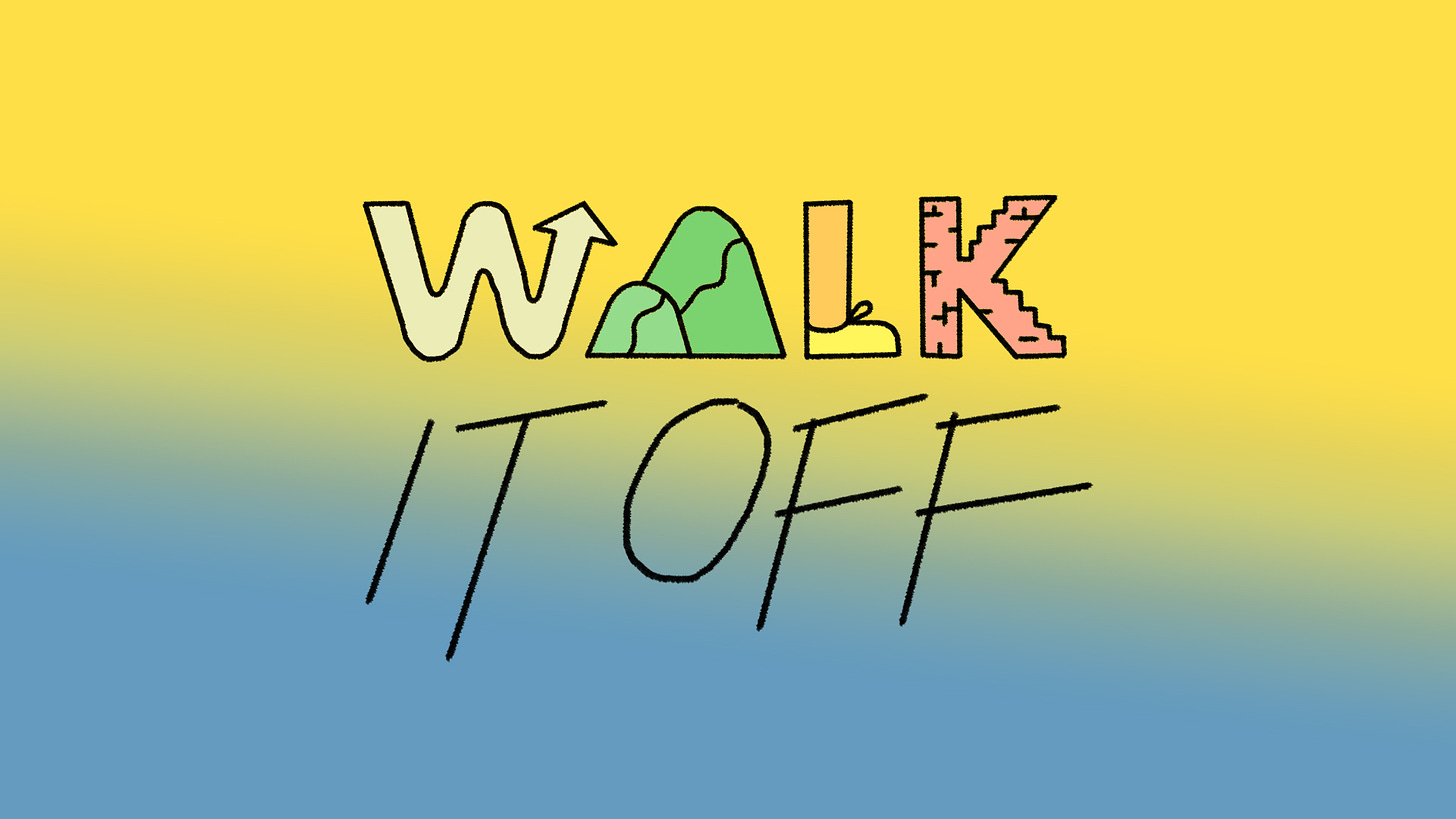
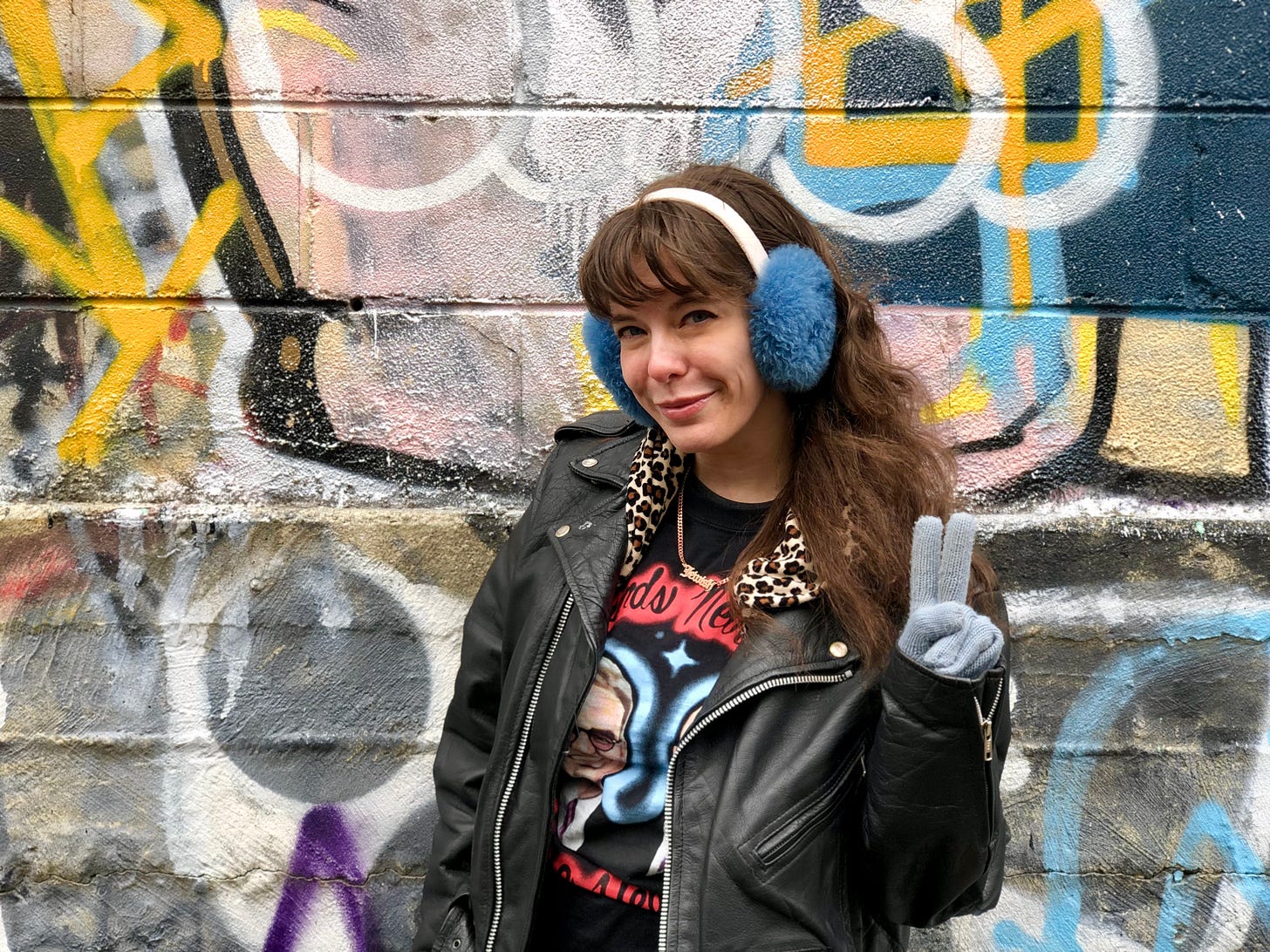


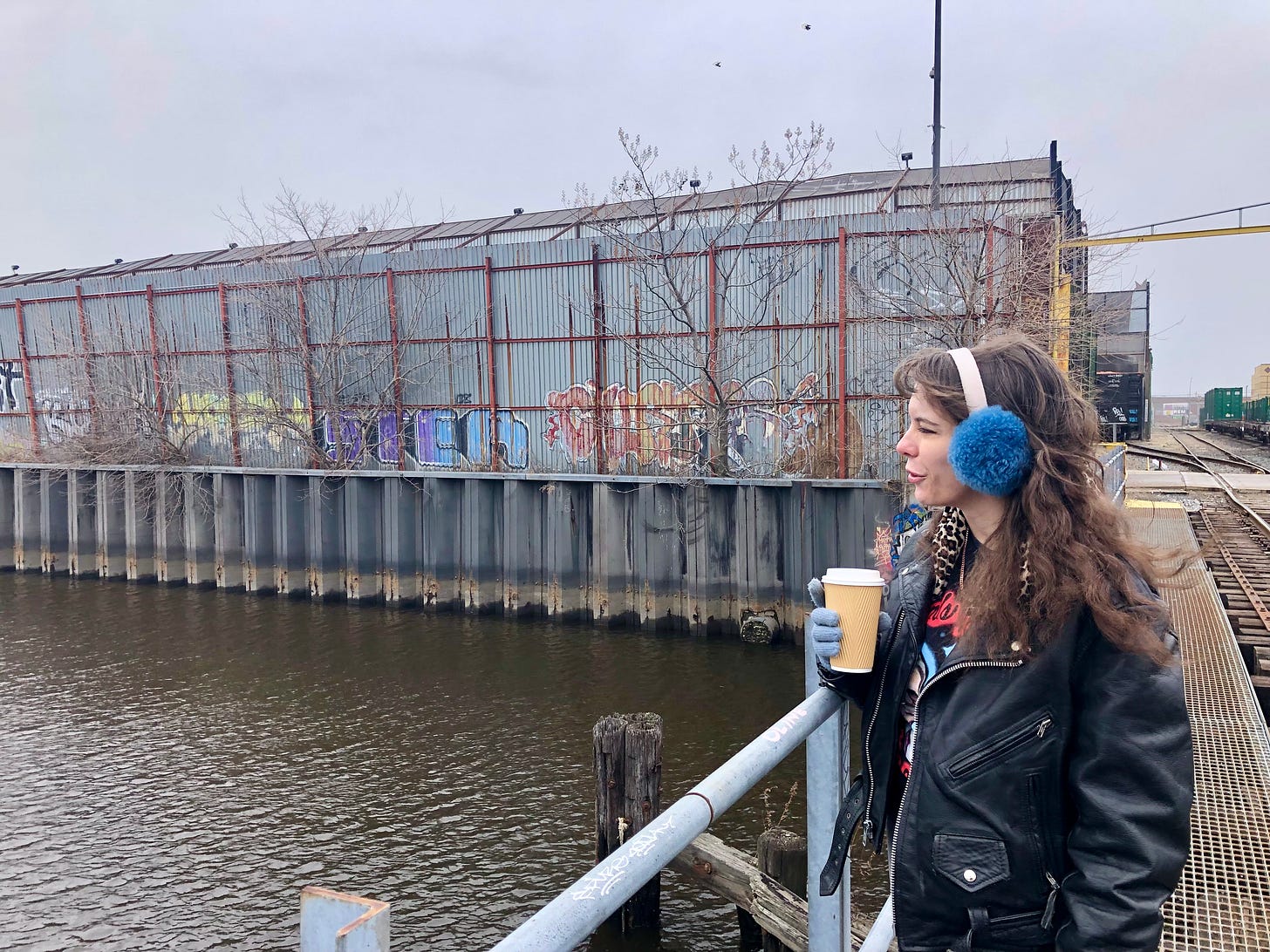



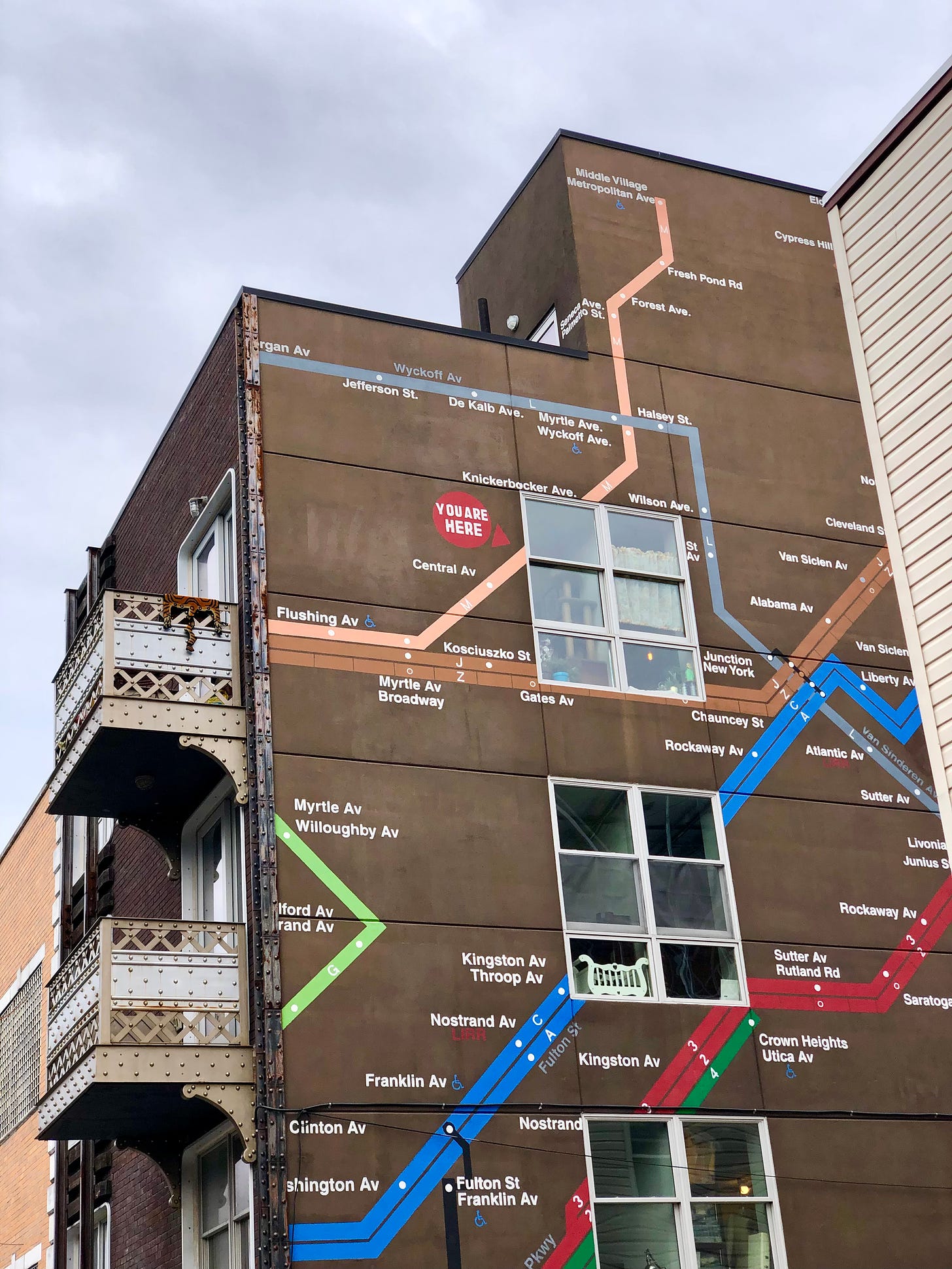
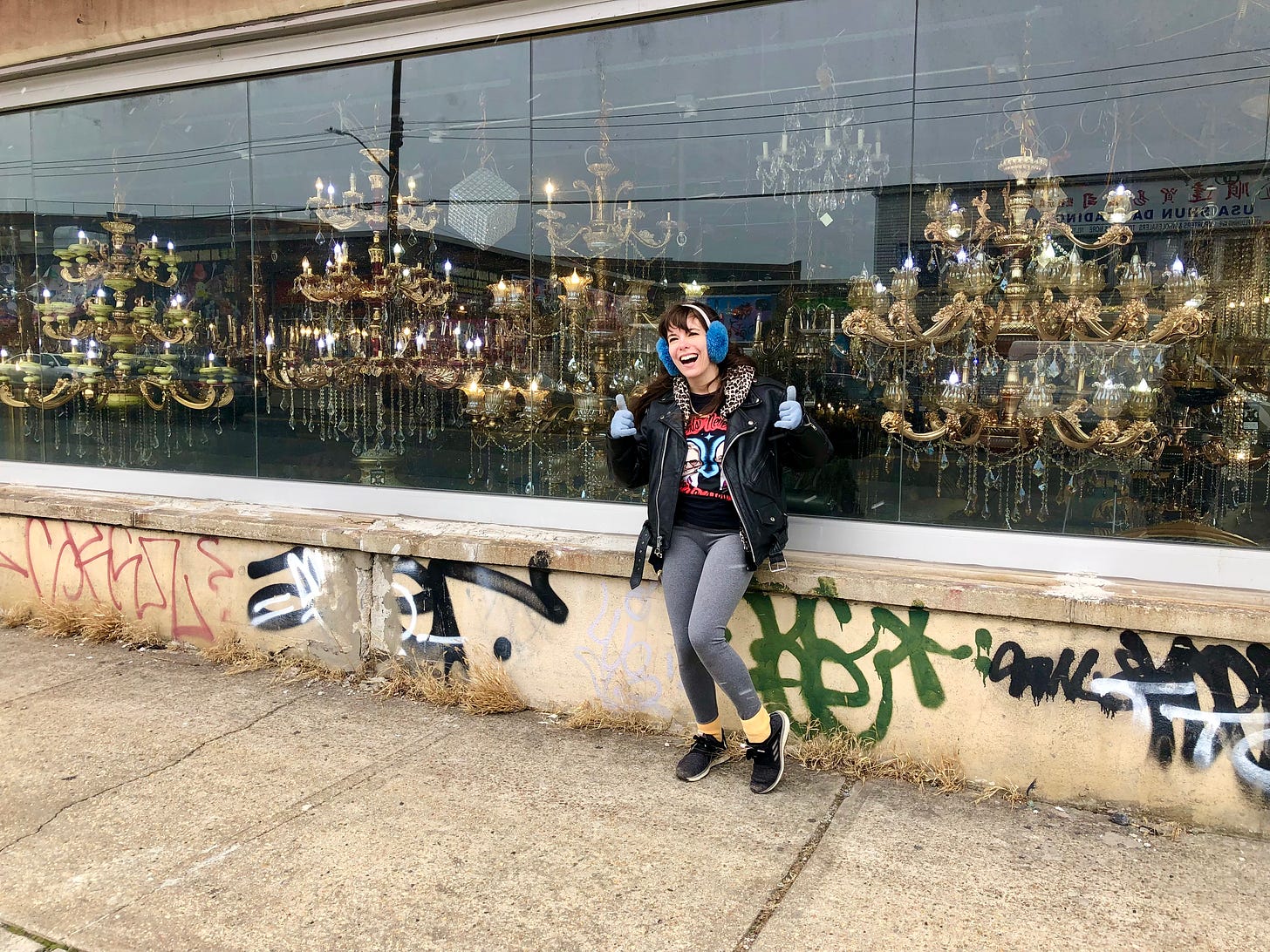
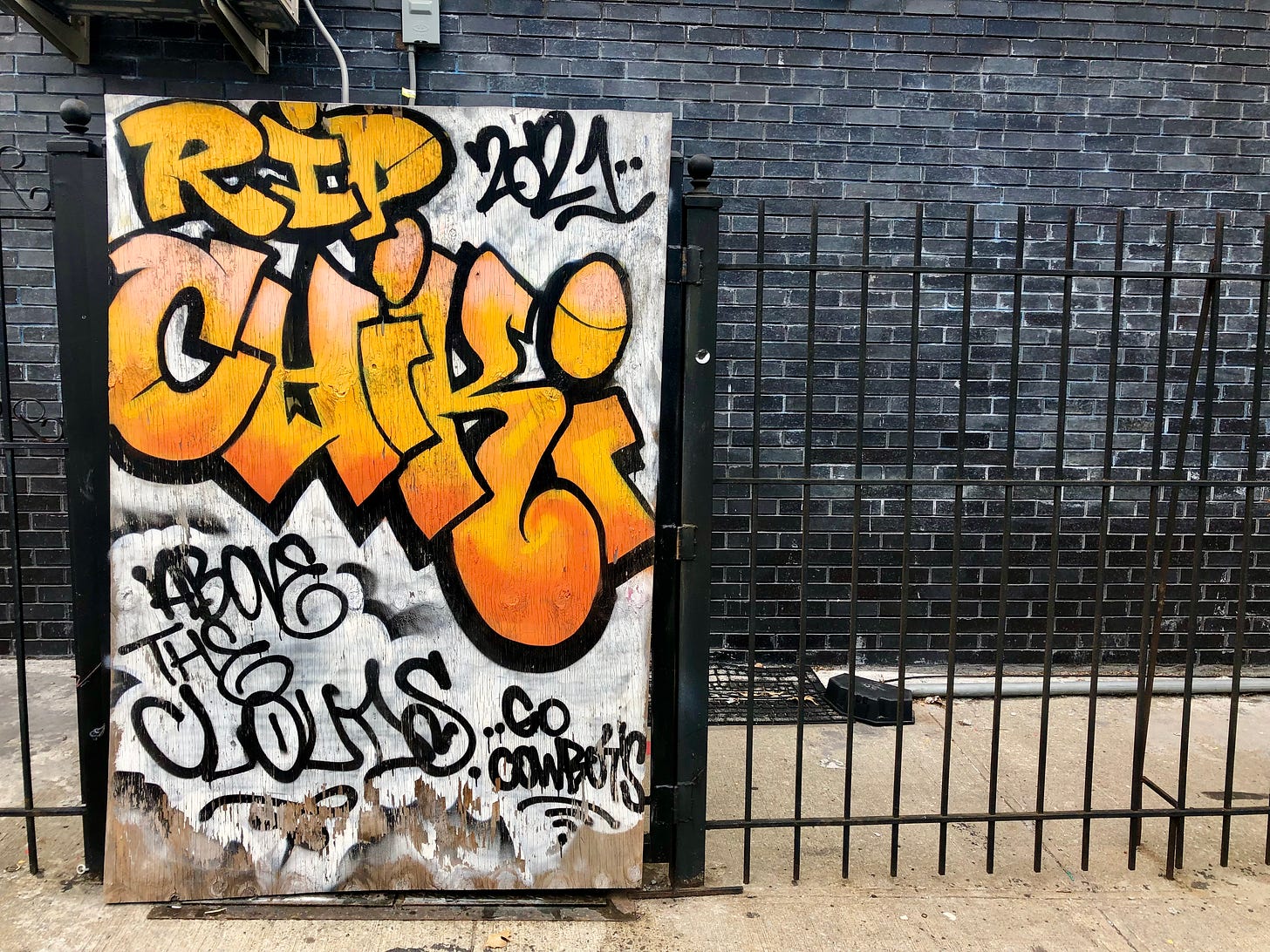
Ok, that's the second time today I've seen Tacky mentioned...just requested it from my library! Another great post, thank you!
I’m really glad I came across this newsletter, it is absolutely delightful. I think it was mentioned in Austin Kleon’s substack or blog a few weeks back.
I’ve read a few and you’ve introduced me to new books and writers, including Tacky. Plus as someone who also embraced walking at the start of the pandemic (and continue to walk daily!) this newsletter speaks to me even more. Thank you!